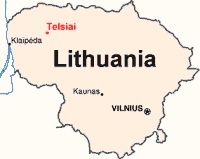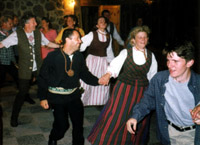The 1999 WCER Congress (16th – 19th August 1999)
Report by Denis Dornoy
|
The 2nd World Congress of Etnic Religions was held from the 16th to the 19th August 1999 in Telsiai, Lithuania. Telsiai is situated in the province of Samogitia, in Western Lithuania. Samogitia was, for several centuries, at the frontline of resistance against the Christian crusaders (the Teutonic knights). |
 |
|
The conference itself took place in a house in the outskirt of the city, built and decorated in traditional Lithuanian style by its owner, Adolfas Gedvilas. A sacred fire has been maintained in the house since 1994. You may visit the Manor of King Ringaudas website to learn more about this wondeful location. |
 |
|
At the end of the first day, participants took part in a fire ritual situated a ceremony on the nearby Satrija Hill. The ceremony was organised by Romuva, with active participation of the Greek representatives.
|
 |
|
The meetings took place in the main hall, and ended with a dance evening offered by the local traditional music ensemble. The next day, participant were invited to a excursion to the nearby city of Klaipeda and the Baltic coast. |
 |
AGENDA OF THE CONFERENCE
Tuesday 17th
| 10.00 | Introduction: The historical background of our meeting place. |
| 11.00 | Speech by Koenraad Logghe (Traditie, Belgium) |
| 13.00 | Lunch |
| 15.00: | Discussion on the list of subject, subject by subject. Every group can voice its opinion, followed by a discussion. Final motions and decisions will be voted on the following day (18th) |
| 18.00 | Dinner, followed by a fire ritual on Šatrija Hill |
Wednesday 18th
| 10.00 | Identification of group representatives. See point 7 of the proceedings. |
| 10.15 | Speeches (15 minutes each) Groupe Druidique des Gaules, France Diipetes, Greece Asatrufelagidh, Iceland Surinder Paul Attri, India/USA Rodzine Wiary, Poland |
| 11.30 | Break |
| 12.00 | Reports for points 1 and 2 |
| 13.00 | Lunch |
| 15.00 | Review of the Statutes |
| 15.30 | Discuss point 3 – Information Centre, Newsletter |
| 16.30 | Discuss point 4 – NGO recognition |
| 17.00 | Break |
| 17.30 | Vote on issues and elect a director and a steering committee. |
| 19.00 | End of the Conference |
You may read reports and speeches from the conference in Issue 2 of the Oaks magazine.
PROCEEDINGS, DECISIONS, AND CONCLUSIONS
| 1 | Real situation of the organisation: Information from our members about their own home situation. | ||
| Speeches were made to that effect by: * Koenraad Logghe, Traditie, Belgium * Jean-Lionel Manquat, Groupe Druidique des Gaules, France * Kostas Kehagias, Diipetes, Greece * Jörmundur Ingi, Asatrufelagidh, Iceland * Surinder Paul Attri, India * Matheusz Piskorski & Sashko Potrebowski, Rodzima Wiara, PolandSome of these speeches will be available on the WCER Web site |
|||
| 2 | Strategy for our activities. | ||
| * How can we plan our activities? We have to get close connections with religions of different countries. Before the congress started, a lot of Hindus contacted us to support our initiative. It is necessary to intensify these contacts through specialists like Surinder Paul Attri, Dr. Koenraad Elst, and others. They agreed on this point. Also native Indians and Sami should be contacted. This can be done indirectly by official organisations such as KWIA, Unesco, etc. It is interesting to know that, some years ago, Unesco had proclaimed the Year of indigenous people. Surely, there must be something written left about it. It was stressed that each group should follow up religious development in their own countries and report it to the WCER Head Office in Vilnius. We should also support major events by exchanging folkgroups, folk artists, artefacts, addresses, and by promoting traditional culture in our own countries. We should try to influence projects in our own way.* How do we pressure governments for religious tolerance? The pressure on governments can only become real if the Head Office writes a letter and also if each member group supports this pressure by individual actions. Pressure should only be used on special occasions depending on current events. Jonas suggested sending a letter to the council of Europe1 to urge protection for ethnical religions. Vlasis Rassias suggested founding an office of International relations and propaganda. We could have more influence if we were recognised by the UNESCO, but don’t forget that the recognition procedure is extremely difficult. Perhaps it would be better to concentrate on empowerment of the WCER before urging recognition.* How can we give financial help to members? The same thing can be said about the financial aspect. Perhaps we could get some support if we were recognised by the UNESCO, but it us, in the beginning, almost impossible to get this recognition. So let’s concentrate on the money received from the members. Let us create 2 funds: a working fund, and an emergency fund. |
|||
| 3 | Whom should we have relations with? | ||
| * How do we extend our contacts with other native cultures and religions? We should have relations with true native religious groups, which have a cultural and traditional basis for their movements.We should not support, accept as member or have relations with newly invented hybrid, non-traditional religious groups.We may have friendly relations and selective contacts with other organisations such as the Pagan Federation, but make it clear that we are different organisations with different views and goals.Expansion of the WCER will consist of attracting other, non-European ethnic religious groups such as Hindus in India, Samis and Finno-Ougrians in Northern Europe, Native Americans in North and South America, Shinto in Japan and others.We will contact the above groups and develop relations systematically, as to ease any distrust these groups may have towards Europeans.Each member group should seek out closer contacts with potential future members of the WCER. The above activity should not resemble missionary work.We should utilise databases and programs offered by UNESCO and KWIA to find other ethnic religious groups. Our purpose is NOT to mix different religions, but to find our common interests and defend them. |
|||
| 4 | Information Centre | ||
| * Newsletter. Who has the right to write in it? Editorial committee and policy to accept articles. An editorial committee will control the content of the Newsletter.* Internet The WCER site will be expanded, particularly the Hindu pages. New members will have their own page, and this Congress report will be added, as well as the new constitution. The WCER Web site will be fully updated latest in October 1999. The Webmaster (Denis Dornoy) apologises for the delay due to heavy professional workload. |
|||
| 5 | Constitution/Statutes | ||
| The statutes were discussed. Some points were clarified, added and modified, and the Statutes were modified accordingly. Some points remain to be clarified, particularly section 4 about the « owner ». The constitution will be posted on the WCER | |||
| 6 | Do we want to be recognised as a Non-Governmental Organisation (NGO) by Institutions under the United Nations, and how do we do it? | ||
| The general feeling after discussion was that, although recognition does have clear advantages, recognition is a long and complicated process. I was agreed that we should collect as much information as possible about recognition, and then make further decisions at the next Congress. We should focus on extending our influence, which will make recognition easier. | |||
| 7 | Election of the Steering Committee | ||
| Voting rights: The following Groups were represented as fully paid-up members: |
|||
| Group name | Country | Voting representative | |
| Traditie | Belgium | Koenraad Logghe | |
| Supreme Council of Gentile Hellenes | Greece | Vlasis Rassias | |
| Association Domus | France | Denis Dornoy | |
| Forn Siðr | Denmark | Morten Groelsted | |
| Rodzima Wiara | Poland | Stashko Potrebowski | |
| Dievturi | Latvia | Janis Brikmanis | |
| Romuva | Lithuania | Jonas Trinkunas | |
| Asatrufelagið | Iceland | Jonas Sigurdsson | |
| Diipetes | Greece | Kostas Kehagias | |
| The following Steering committee was elected :* Jörmundur Ingi * Denis Dornoy * Koenraad Loegghe * Jonas Trinkunas * Kostgas KehagiasThe committee will elect the WCER chairman (later, Jonas Trinkunas was elected Chairman by a majority vote of the committee) |
|||